- Home
- Craig Alanson
Black Ops (Expeditionary Force Book 4) Page 3
Black Ops (Expeditionary Force Book 4) Read online
Page 3
I never finished the thought. The Flying Dutchman’s internal alarm sounded; it was still the Star Trek alarm sound that Adams had requested Skippy program into the system. Before I could focus my eyes on the status display, Skippy shouted over the speakers. “Thuranin light cruiser jumped in, twenty seven lightseconds from the relay station!”
I checked the display. There was a new icon, a bright blazing icon where none had been before. It was on the other side of the relay station, having emerged into one of the designated jump points, where ships would not interfere with the station’s transmitter. The spot where we parked the Dutchman was chosen specifically because incoming ships were supposed to avoid the area, and because the relay station partly masked our ship from sensors. “Do they see us?” I asked as I ran toward the bridge, where Lt. Williams of our SEALS team was holding the command chair for me.
“Not yet, Joe,” Skippy reported. “Our stealth field is effective, and ships are not allowed to use active sensor fields here, to avoid interfering with the relay station. However, the Thuranin have detected our dropship and the Indian team. Technically, what they see are several sets of Kristang suits with jetpacks. They are very curious about that, to the point where they are demanding an explanation from the station, and they have activated their defensive shields.”
“Shit. Uh, tell them, uh-”
“I already told them the Kristang armored suits are an Advanced Research Development experiment in remotely seizing control of Kristang technology, and that the suits are empty. I took control of the suits to make them rigid, I set the faceplates to go opaque so the Thuranin can’t see human faces, and I’m doing my best to mask body heat and other evidence the suits are occupied. Captain Chandra’s team knows the situation and has gone silent. Joe, the Thuranin are buying my bullshit story for now, but I do not think that will last more than a minute. They could use an active tightbeam sensor probe on Chandra’s team, and they’d find out real quick that humans are in those suits.”
My inexperience showed in me wasting time asking a stupid question. “What the hell is that ship doing here?!”
“There was a battle against the Jeraptha in the adjacent sector; the battle was a draw but several Thuranin ships sustained significant damage, including that ship. That light cruiser was escorting a pair of battleships that need urgent repairs, so that ship was sent on ahead as a scout. Those two battleships, and fourteen other warships, will be here within the hour.”
“All right, all right,” I frantically tried to think. We could jump the Dutchman away, abandoning the Indian team. And Chotek, Simms and Dr. Friedlander. And, dammit, the French team also, I realized with shock. Although Giraud and his paratroopers were near us, they were outside the ship, floating in space with jetpacks. If we jumped the Dutchman, the French would be killed by the distortions of the jump field. “We’re not leaving our people,” I declared mostly to myself. “We need to kill that ship. We are, you said, twenty seven lightseconds away?”
“Correct,” Skippy replied, and did not take time to remark that data was on the main bridge display.
“So, whatever we do here, the Thuranin won’t know about it for twenty seven seconds? How long would we need to accelerate to get far enough away for Giraud’s team to survive us jumping?”
“Thirty four seconds to be safe, but we could live with a minimum of twenty one seconds if I compress our jump field.”
“Pilot, signal Giraud what we’re doing, and get us moving. Skippy, we need to jump in right on top of that ship and hammer them with everything we’ve got, before they can react.”
“I’ll do my best, Joe.” The ship lurched as the pilots input Skippy’s selected course and kicked in emergency acceleration. “Weapons are preprogrammed for release on your authority; jump is also programmed and counting down. Eighteen seconds to jump. Seventeen. Sixteen-”
There wasn’t time to plan or discuss with Skippy what we were going to do; I had to trust that he knew much more than us about Space Combat Maneuvers. After twenty one seconds of acceleration that we actually felt, the Dutchman jumped. It was easier to be precise with a short jump covering less than half a lightminute, but on this jump Skippy needed to be more precise than ever before, working against the handicaps presented by quantum mechanics.
Skippy explained later what he tried to do, and what actually happened. The Thuranin ship’s shields were activated; Skippy knew that ship had sustained significant battle damage and had weak spots in its defensive systems. Still, the relatively weak maser cannons of our rebuilt star carrier, and our pitifully few ship-killer missiles, could not be certain of killing or disabling that ship in our first volley. We would not get a second chance; even a damaged light cruiser could batter our pirate ship to pieces, or trap us in a damping field and slice us up at their leisure. We needed to take down their shields before we could hit them. The only way to do that was to jump in so very close, the event horizon of our inbound jump wormhole interfered with their shields and caused a cascading failure of their shield generators. It was a tactic of absolute desperation that had never been done before, as far as Skippy knew.
Naturally, he was super eager to try it.
“Five. Four,” Skippy counted down. “Hold my beer, watch this.”
“Hold my beer? Don’t-”
“One. Jump.”
Renee Giraud blinked to clear spots and starbursts swimming in his vision. Even though the Kristang armored spacesuit had made its visor go opaque before the Flying Dutchman jumped away, intense light and heavy-particle radiation from the jump wormhole had blasted him and his team. The voice of the suit’s computer, a voice the Americans called ‘Bitching Betty’, had been calling out warnings of radiation exposure and helpfully notifying him that the anti-radiation meds the suit normally would administer were not available. Betty advised Giraud to seek medical attention as soon as possible, and she advised him of that fact every four seconds until he figured out how to turn the damned thing off.
“Merde,” Giraud said to himself, his voice echoing loudly in the helmet. The suit’s supply of anti-radiation medicine was empty, because those meds were designed for Kristang biochemistry, and would be poisonous to humans. Skippy the alien AI had promised he was working on retrofitting the suits with medical nanomachines appropriate for humans, but Giraud knew the ship’s supply of medical nano was thin. If he returned to the ship, he was sure Skippy the mad scientist would have his scary medical bots administer advanced treatments to clear the radiation damage from Giraud’s body.
If he returned to the ship. If the ship returned at all.
He did not know what had happened to their pirate star carrier. Giraud had received a warning that a Thuranin light cruiser had jumped in near the relay station; his own suit confirmed that observation with a blinking icon in the visor in front of his eyes. The Flying Dutchman had accelerated away, while Giraud’s team had burned their jetpacks in the opposite direction, until Giraud ordered the team to conserve thruster fuel. The tiny extra distance they could gain from burning hard with the jetpacks was meaningless, and they might need every ounce of jetpack fuel later.
Giraud checked the time in the bottom left corner of his visor, less than thirty seconds had passed since the giant, spindly star carrier had jumped away. It felt like much longer; he had spent the first ten or fifteen seconds disoriented and spinning wildly. After he engaged the jetpack’s automatic stabilizer, gyroscopes had halted his spin and he had spent precious seconds checking the status of the suit and jetpack, and turning off the Bitching Betty before her annoying voice rendered him deaf. “Team,” he called out, “report-”
The visor, which had just returned to clear after going completely black right before the Dutchman jumped, went into protective mode again. The display on the inside of the visor gave Giraud a view of a short, intense space battle raging close by, then the display registered a ship exploding and a gamma ray burst almost at the exact same time. “See-lonce,” Giraud ordered using an internat
ional standard term for radio silence, then turned off his transmitter.
A starship had exploded, and a starship had jumped away, or attempted to jump away. Which ship had been destroyed, perhaps both of them? His suit’s sensors were not able to determine exactly what had happened twenty seven lightseconds away; the explosion had been so violent it was impossible to tell whether one or two ships had been consumed. Giraud did not like their star carrier’s chances against a cruiser, unless Skippy had been able to perform some magic on very short notice. During Giraud’s crosstraining in the ship’s Combat Information Center, Skippy had explained that every starship’s jump drive had a distinctive signature, and that signature could identify the type of ship, even a specific ship if the data on that ship’s jump characteristics was known.
His suit’s computer lacked the ability to analyze jump signatures, and Skippy’s magic always slightly altered the Dutchman’s signature with each jump, to prevent anyone from identifying or following their stolen star carrier. So, Giraud told himself, he did not know whether the Dutchman had survived. If both ships had been destroyed, what should he do? Contact Captain Chandra of the Indian paratroop team, and get both teams over to the relay station? That would only be a temporary solution, for they were doomed without a starship to carry them home. Going aboard the relay station would be for the purpose of self-destructing that station, erasing any evidence of humans flying around the galaxy. Along with erasing the actual humans, including Chotek and his team.
If the ship that exploded was the Flying Dutchman, then the Thuranin cruiser might still be in the area, or could return soon. In that case also, the priority would be destroying evidence of human activity. Even if the Thuranin cruiser had been destroyed, if the Dutchman had been so damaged that she was unable to return, then Giraud, his team, the Indians and Chotek were all stranded and had only one course of action.
The only possibility for survival was if the Dutchman had somehow escaped the battle, jumped away, and was able to return. Giraud would know their pirate ship survived only if that ship jumped back in. Plan against disaster, he decided, and hope for the best. There was no point planning for the Dutchman’s return, because there wasn’t anything he or his team could do to help that blessed event happen.
His suit remained rigid and in defensive posture as light and heavy particles from the explosion twenty seven lightseconds away washed over him, then the visor blinked clear again. Or almost clear; sections of the faceplate were gray or black. Warning icons were flashing around the edges of his visor. The suit had been damaged, that was obvious from even a quick scan of the status icons. The jetpack had sustained the worst damage, having automatically spun around to protect Giraud by putting its mass between his fragile body and the heavy charged particles of the explosion. Communication with the jetpack’s computer were garbled; according to the status he could read, the unit was able to activate only one of its jets. With a single jet, all Giraud could do was fly uselessly in a circle. Irritated the sophisticated alien technology had failed him, he concentrated on the suit’s sensors. While they were partially blinded, he was still able to see blinking icons showing the last reported position of his team, Chandra’s team and the relay station. Damaged or not, the sensors certainly would be able to see the gamma ray burst if the cruiser had jumped in, and there was no such data on the visor display. Knowing the cruiser might arrive on top of them at any minute, Giraud took advantage of what might be a brief opportunity. “See-lonce fini,” he announced. “Team, status check.”
All but one member of the team reported in. His visor display showed the silent paratrooper was alive, likely unconscious. Giraud had been shocked to see how far apart his team was, headed off in multiple directions at a speed higher than their jetpacks had been able to impart. The spatial distortion of the jump wormhole had not only bathed the French team in radiation, it had thrown them far and scattered them like butterflies in a strong wind. Only one of the team had a fully working jetpack; Giraud ordered her to fly over to the unresponsive man. If needed, she might be able to use her jetpack to bring the injured paratrooper to the relay station for whatever medical treatment might be available. “Captain Chandra, respond, please.”
Chandra answered after a few seconds; the man had been busy dealing with his own team. Although the Indians had been farther from the spatial and radiation effects of the Dutchman’s jump wormhole, they had been closer to the heavy particles of the explosion, and he had two people unresponsive. None of the Indians’ jetpacks were operational, the dropship was in the process of collecting them. “No,” Giraud replied to Chandra’s offer for the dropship to pick up his team. The ‘Falcon’ dropship was the smaller of the two Thuranin models, and could barely accommodate Chandra’s people. “I think it is best to get your team aboard the relay station and prepare it for self-destruct. Send the dropship back for us when you can.”
“Are you sure, Rene?” The other paratroop commander asked.
“Yes. My suit computer says I’ll be dead without treatment for radiation poisoning,” he chuckled with gallows humor. “If that happens, I would rather be out here than having my corpse stinking up the relay station.”
“Ok,” Chandra forced a sympathetic laugh. “We also got a dose of radiation from the explosion. I hope Doctor Skippy makes house calls. Rene, I ordered my team to put the Sandman protocol on standby.”
“I did the same,” Giraud acknowledged. If any of the Merry Band of Pirates were about to be captured, it would be best for them to set off a nuke to erase even DNA evidence. Failing that, none of them could allow themselves to be captured alive. On every mission away from the ship, each soldier and pilot wore a tiny dot on the back of his or her neck, as a high-tech sort of suicide pill. It was a tiny, tightly-packed cluster of nanoparticles. According to Skippy, activating the suicide dot would send an electrical pulse to the wearer’s brainstem, killing them instantly and painlessly. The dot would then release nanomachines into the person’s brain; those machines would swim through blood vessels to vital sites in the brain, and fire simultaneously to fry every memory engram and synapse in the mass of gray matter known as the human brain. Skippy had assured Hans Chotek that not even the super advanced technology of the Maxolhx would be able to recover any memories from a brain so thoroughly scrambled.
Rene Giraud was used to the almost imperceptible sensation of the suicide dot attached to the base of his skull, although he was always aware of its disturbing presence. The dot could be triggered by the wearer, or triggered remotely by any commander with the access codes. At the end of every away mission, even in training, he was happy to peel the dot off his skin and drop it in a box. Skippy said the dot was not in any way harmful, except for the obvious, but Giraud was certain he could feel his skin’s irritation when he showered after a mission. Although he had to admit, he had never been able to detect a rash where a suicide dot had been attached to anyone else’s neck.
On the visor, he watched the icon representing the Falcon dropship flying around, picking up the Indian team. There was no response from the relay station, which was odd and disturbing. There was also no gamma ray burst from a murderous alien warship. Minutes passed, Giraud’s main activity was trying to remain still, for any movement sent him into a tumble. The jetpack’s stabilizing gyroscopes were inoperable, or the jetpack’s computer was unable to control them, for the flying machine attached to his back was a useless lump of alien technology. He had ordered his team to remain attached to their jetpacks, if the Flying Dutchman returned it would be best for their dropships to pick up crew and jetpacks at the same time, rather than flying around willy-nilly chasing twice as many objects. Giraud was certain that if the ship did return, Colonel Bishop would want them to get the hell out of there as quickly as possible.
Gamma ray burst! Not close enough to give them another damaging dose of radiation, and not close enough that his suit’s failing sensors could identify the ship. He braced himself to transmit the suicide order.
The Flying Dutchman jumped, which is something I usually know only because the bridge display told me we had gone from one empty area of interstellar space to another. Once in a while, we jump and a star becomes a bright disc instead of a faint dot. Or a planet appears at the edge of the display.
This time, we jumped in so close to the enemy cruiser that it was RIGHT THERE. The display wasn’t needed; I could have looked out a porthole and read the registration number on the side of the enemy ship. My heart was in my throat as we went whizzing past way, way too close; for a split second I thought Skippy had screwed up and we would collide.
Then all hell broke loose.
With the cruiser’s shields knocked offline by the spatial distortion of our jump wormhole, our masers bit into the unprotected armor plating of their hull, slicing deeply into the decks under the armor. We blew out two of our irreplaceable maser cannons in that first volley, with Skippy channeling energy directly from jump drive capacitors into the cannon exciters. That was way more input energy than the exciters were capable of handling, so they blew just after sending gigajoules of maser power into the enemy ship. The Dutchman’s speed relative to the enemy carried us by so quickly we only had one slicing shot with the masers, so four of our missiles followed close behind the deadly maser beams. Unknown to me, Skippy’s programming of the missiles had them surging out of their launch tubes while the Dutchman was still within the wormhole.

 Valkyrie (Expeditionary Force Book 9)
Valkyrie (Expeditionary Force Book 9)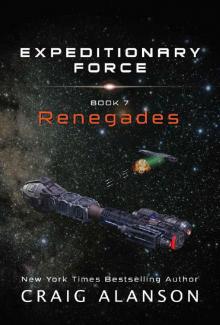 Renegades (Expeditionary Force Book 7)
Renegades (Expeditionary Force Book 7)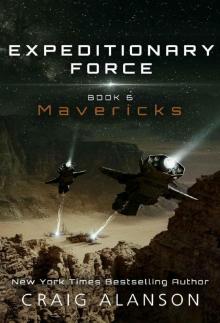 Mavericks (Expeditionary Force Book 6)
Mavericks (Expeditionary Force Book 6)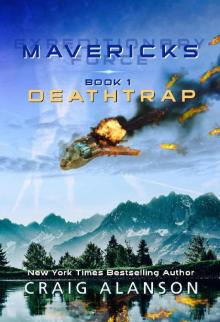 Deathtrap
Deathtrap Armageddon
Armageddon Deceptions (Ascendant Book 3)
Deceptions (Ascendant Book 3) SpecOps (Expeditionary Force Book 2)
SpecOps (Expeditionary Force Book 2) Trouble on Paradise: an ExForce novella (ExForce novellas Book 1)
Trouble on Paradise: an ExForce novella (ExForce novellas Book 1) Transcendent (Ascendant Book 2)
Transcendent (Ascendant Book 2) Columbus Day (Expeditionary Force Book 1)
Columbus Day (Expeditionary Force Book 1)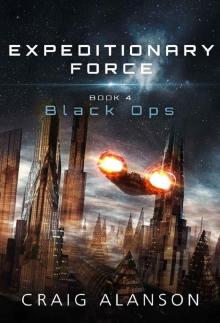 Black Ops (Expeditionary Force Book 4)
Black Ops (Expeditionary Force Book 4)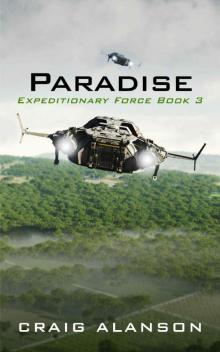 Paradise (Expeditionary Force Book 3)
Paradise (Expeditionary Force Book 3) Ascendant
Ascendant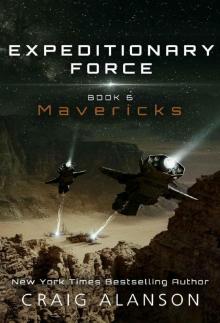 Mavericks
Mavericks Zero Hour (Expeditionary Force Book 5)
Zero Hour (Expeditionary Force Book 5)